Crisis of confidence: can Britain’s police recover public trust?

Roula Khalaf, Editor of the FT, selects her favourite stories in this weekly newsletter.
In a square outside Barking town hall, east London, a sombre-faced Helen Ball, assistant commissioner in the Metropolitan Police, on Friday walked nervously up to a bank of microphones and cameras. She had come to apologise, minutes after an inquest jury had delivered their verdict on what they called “fundamental failings” in the force’s investigation of four murders in 2014 and 2015 by Stephen Port, a serial killer.
The verdict, which Ball admitted was “devastating”, was that three of the murders could probably have been avoided if the first, of Anthony Walgate in June 2014, had been properly investigated. Members of the victims’ families glowered at her from the other side of the television cameras.
Such spectacles have become a grim routine for senior UK police officers. Ball’s appearance came two months after Met commissioner Cressida Dick offered a similar apology outside London’s Old Bailey after the trial of Wayne Couzens, a former Met officer. Couzens used his force-issued warrant card in March to abduct, rape and murder Sarah Everard, a 33-year-old woman walking home in Clapham, south London.
These cases are the latest in a series of high-profile scandals around police conduct that have brought the UK’s forces under scrutiny. They include the revelation that Greater Manchester Police failed to record around a fifth of the crimes reported to it in the year to June 2020.
However, Ball admitted that the Met — which has twice the officer numbers of the country’s next-largest force — faced particularly probing questions after the jury’s scathing findings.
“We’re . . . deeply sorry that there were failings in the police response to the murders,” Ball said. “I give my own and the Met’s heartfelt apologies.”
As Ball retreated into the town hall, she left unaddressed rising public concerns about the culture, efficiency and effectiveness of British policing. Those concerns are particularly intense for sexual assault and rape crimes and cases involving minorities, such as the Barking murders, where the victims were all young gay men.
The families were furious that the Met successfully sought to have the jury barred from considering how far the force’s investigation into the murders by Port was influenced by homophobia. They remain convinced that prejudice played a role.
“Had four white, heterosexual girls been found dead in the same manner as Anthony, Gabriel, Daniel and Jack, then the police’s actions, and the likely outcomes, would have been different,” Neil Hudgell, a solicitor for the victims’ families, told reporters after the Barking verdicts.
The homophobia accusations — which the Met denies — come on top of other claims — also denied — that race played a role in the mishandling of the murders last June of Bibaa Henry and Nicole Smallman, two mixed-race sisters killed in a park in north-west London. The Met initially refused to take seriously family members’ reports that the women were missing. Two officers have since been jailed for criminal misconduct after taking photos of the women’s bodies and sharing images of the crime scene on WhatsApp.
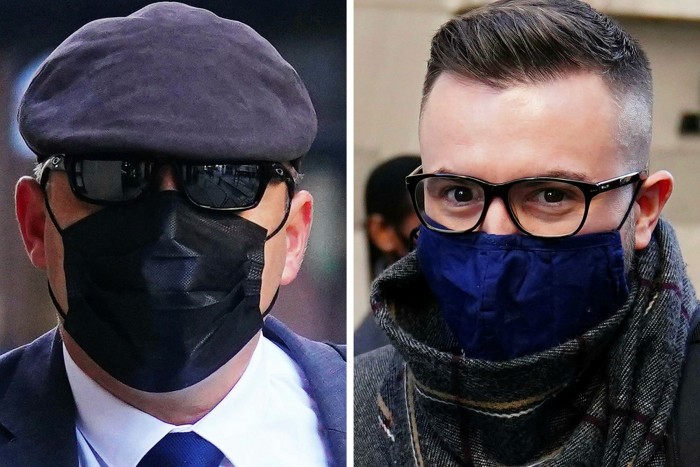
Police failings around these three crimes — Port, Couzens and the murder of the two sisters — “cover fundamentally different areas around gender, around race and around sexuality”, says Dal Babu, a former Metropolitan Police borough commander now advising London Mayor Sadiq Khan. “But underlying it all are the issues around the culture of the organisation and the lack of resources.”
Part of the problem is that UK policing is stuck in a vicious circle, says Babu, where funding cuts are followed by upsurges in crime that trigger new investment in previously abandoned initiatives. “We’re at a crisis point in policing and I just wonder whether this [crisis] will be the nudge to say we need to have a different approach to policing and stop this constant reinvention cycle,” he says.
Louisa Rolfe, assistant commissioner of the Metropolitan Police, describes recent months as “a watershed moment”. Commissioner Dick has launched a “wholesale review of culture and standards” at the force in light of the Everard case. Home Secretary Priti Patel has also called for an inquiry aimed at establishing a “definitive account” of the events leading up to the murder, as well as “wider issues across policing” including “vetting practices, professional standards and discipline, and workplace behaviour”.
Ball told reporters in Barking that the force had been working “for some time now” to rebuild trust in the Met. A survey by YouGov for the End Violence Against Women coalition found 47 per cent of women and 40 per cent of men reported declining trust in the police following the Everard case.
“We completely accept that people’s trust in us has been damaged by a number of recent events,” Ball said.
The low conviction rates for hard-to-investigate crimes such as sexual violence, and lengthy delays in bringing offenders to justice, have also raised worries about forces’ ability to keep the public safe.
Rolfe says the Met-commissioned review following the Everard case will be “root and branch” and look into “all aspects” of the force’s culture and standards.
“This is something which is a deep societal issue for us,” she adds. “The public rightly expect so much more of policing.”
Austerity bites
Concerns over the police’s competence in handling complaints of rape and sexual assault, both inside and outside the force, have been particularly acute since Everard’s death. Several police officers have been accused of sexual violence, including two allegations of rape by serving Met officers. Meanwhile forces in England and Wales received reports of 61,158 rapes in the year to June, 9.6 per cent up on the previous year. The proportion resulting in a charge or summons in the same period barely changed, running at 1.5 per cent in the year to June against 1.4 per cent the previous year.
Betsy Stanko, a criminologist who has worked on improving police forces’ response to sexual violence, says that women are “pissed off”. “I’ve never seen women so angry,” she says.
The low conviction rate for rape reflects wider problems brought on by austerity spending cuts after 2010, according to Stanko. “What we have is a policing organisation that’s running around to put plasters on things — in England and Wales in particular,” she says. Forces in the two nations lost more than 21,000 officers — around 15 per cent of the total — between 2010 and 2018. Between 2010 and 2017, 18,000 civilian police staff were lost.
The cuts, says Stanko, came as publicity following the death in 2011 of Jimmy Savile, a paedophile celebrity, produced large volumes of new, complex claims of historic sexual abuse. The #MeToo movement has similarly prompted a wave of difficult investigations, as have reports of abuse in churches, youth organisations and other settings. The jury in the Barking inquest acknowledged that the officers investigating the deaths had all been severely overworked.
“They’ve basically pushed rape and sexual assault to the back of the queue,” Stanko says. “These are really complex cases. [The situation produced] maximum complexity and fewer resources to investigate it.”
Getting an investigation off the ground is not the only hurdle. In a report earlier this year, HM Inspectorate of Constabulary and Fire & Rescue Services, the sector’s watchdog, said it had found numerous examples of serious criminal court cases that had been cancelled at short notice, although the offences had taken place a long time before.
Rick Muir, director of the Police Foundation, a think-tank, attributes the low conviction rate and slow progress on many investigations to forces’ struggle to adapt to a shift from crime committed in public — such as bar fights — to ones committed in homes or other private places.
“It’s just more complex to investigate a crime where there are no third-party witnesses and it’s taken place between two people who know each other,” he says.
Significant volumes of more straightforward work have also landed on forces. While coronavirus lockdowns have reduced levels of serious violent crime, offences such as fraud have increased. Violent crime has also rebounded in some areas following the end of lockdowns.
“What you’ve had effectively is an increase in crime and I think added to that is that we’ve had significant cuts in children’s services . . . so a lot of the glue around safeguarding and keeping people safe has dissipated,” Babu says.
Police forces in England and Wales are recruiting 20,000 new officers to make up for past cuts. But Babu points out that, while numbers are again rising, there has been a far less systematic effort to replace the lost police staff, the personnel who work in offices and support colleagues on their beats. “These are the men and women who would be analysing data, making sure officers are deployed efficiently,” he says.
The new officers will also take time to become effective crime-fighters. “You don’t become a police officer overnight,” he adds.
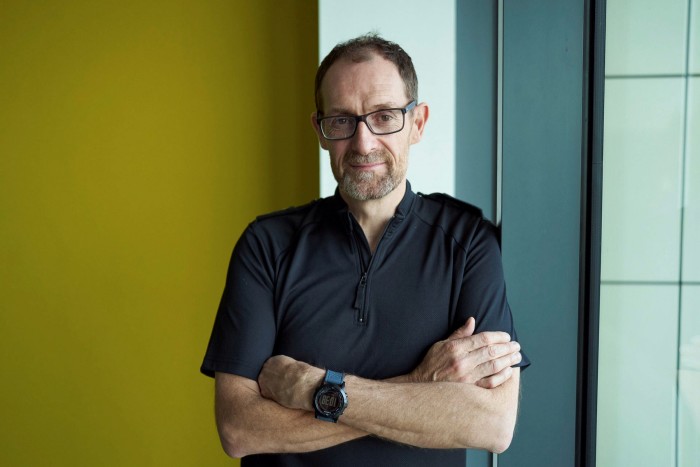
Evidence-based policing
Despite limits on resources, some forces in the UK are redoubling efforts to improve their policing — and restore the public’s faith — by applying new methods backed by data and research.
A walk round the market town of Bridgwater, 35 miles south-west of Bristol, with constable Max Priestley and Rebecca Lewis, a civilian support officer, reveals the new thinking. The pair, who both work for Avon and Somerset Police, are part of a trial, backed by £660,000 in Home Office funding, of a technique known as “pulse patrols”. The officers embark on 15-minute foot patrols of places that generate the highest number of calls about crime at the busiest times.
The officers switch on their body cameras so that supervisors can check they are following instructions in speaking to the public.
James Raphael, a detective superintendent in charge of the trials, says street violence in the targeted areas has fallen by 13 per cent since they began in June compared with previous years. “When we’ve spoken to shopkeepers they have come back to us saying that having that visibility and engagement has meant that antisocial behaviour has dropped off,” Raphael says.
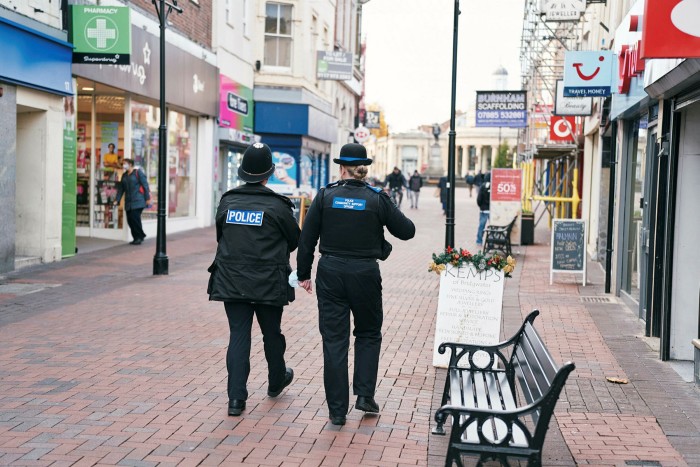
The pulse patrol trial is an example of an approach known as “evidence-based policing”, under which policing techniques are treated as experiments, with certain strategies’ effectiveness measured against other areas where policing remains unchanged.
A range of forces are hoping that evidence-based techniques will improve their policing — including the Met, which has trialled techniques to help parents of young people involved in crime to steer them away.
In Bridgwater, it is clear that the officer’s arrival on Fore Street reassures some of the public, including a security guard at the town’s Boots store, who says he is “sick to death” of a group of people he suspects of shoplifting.
“They walk past smiling at me like it’s some kind of joke,” the guard tells the officers. Priestley promises to call by later to pick up video from the shop’s security system to identify those responsible.
Lawrence Sherman, director of the University of Cambridge’s Police Executive Programme, says that if followed rigorously the technique can transform forces’ crime-fighting capabilities. “I think what the police are doing now with evidence-based policing is developing the science of policing in a way that’s never been practised before,” he says.
Other reform efforts involve reviewing standard police practices and, where necessary, breaking with orthodoxy. Project Bluestone, another Avon and Somerset Police initiative, aims to improve conviction rates for rape and sexual assault by concentrating investigation on the perpetrator. Typically police focus on testing out a victim’s account which, according to Stanko, who was lead adviser on the project, can miss vital clues such as a pattern of complaints against an individual perpetrator. Stanko says that what the project has found about the shortcomings of current techniques and the scope to improve them has been “amazing”.
She is now working on a drive to bring the technique to other forces, including the Met. “I do think we’re going to get a fundamental shift,” she says. “What we want is officers who think critically, who learn from others, who are willing to be open and ask for help.”
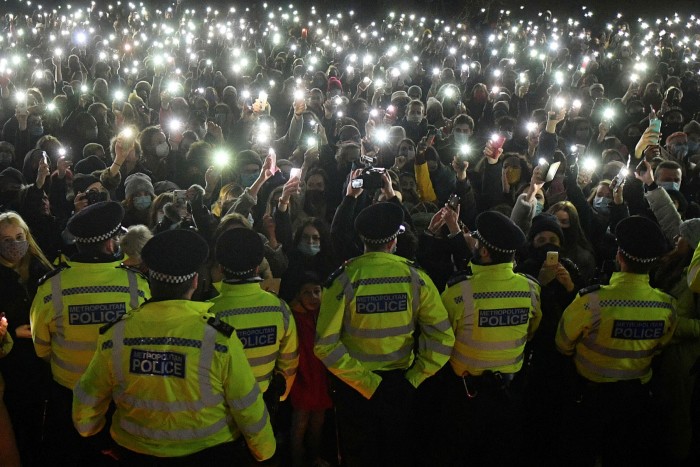
Specialists wanted
Like many people who have worked in or studied policing, Stanko believes forces need to move away from using generalist officers to investigate crimes. “They have omni-competent officers with no specialist skillset, making biased decisions,” she says.
More specialism is required, she believes, given the growing complexity of investigations into areas such as computer-based fraud and the constant need to decode electronic devices. The problem is exacerbated by the regular poaching of officers who have specialist digital skills to higher-paying jobs in the private sector, she adds.
“I would bring in expert advisers,” Stanko says. “There’s no reason why you can’t have civilian investigators.”
More effective policing would help resolve some of the legitimacy problems, especially in minority communities, says Sherman. “If you want to talk about police failure to protect black Britons from murder, that’s a very substantive reason for that population to disapprove of police practice,” he says.
He points out that members of ethnic minorities — who report some of the lowest levels of confidence in the police — are disproportionately victims of crime. Survey evidence shows that they are likely to support tough measures to tackle offending. “If you listen to the voices of relatives of homicide victims, they want more focused policing in ways that will be criticised for things like [repeated use of] stop and search,” he says.
Sherman, who started his career with the New York Police Department, adds that people in the UK expect a lot from their forces — setting the police up for disappointment. “I think British policing is challenged by some of the highest expectations of any country in the world for what they want the police to do,” he says.
But confidence in the police, though subject to peaks and troughs, has rarely ebbed so low. Babu believes that the current crisis presents an opportunity for revaluation, but warns that changes may prove as ephemeral as they have in the past.
He hopes for a permanent transformation, one in which British police forces would become less insular and defensive and more outward-looking. “It’s about getting the culture of the organisation to change, understanding [public] confidence, engaging with the community and working more effectively in terms of partnerships,” he says. “It’s not rocket science.”
Data and visual journalism by Alexandra Heal
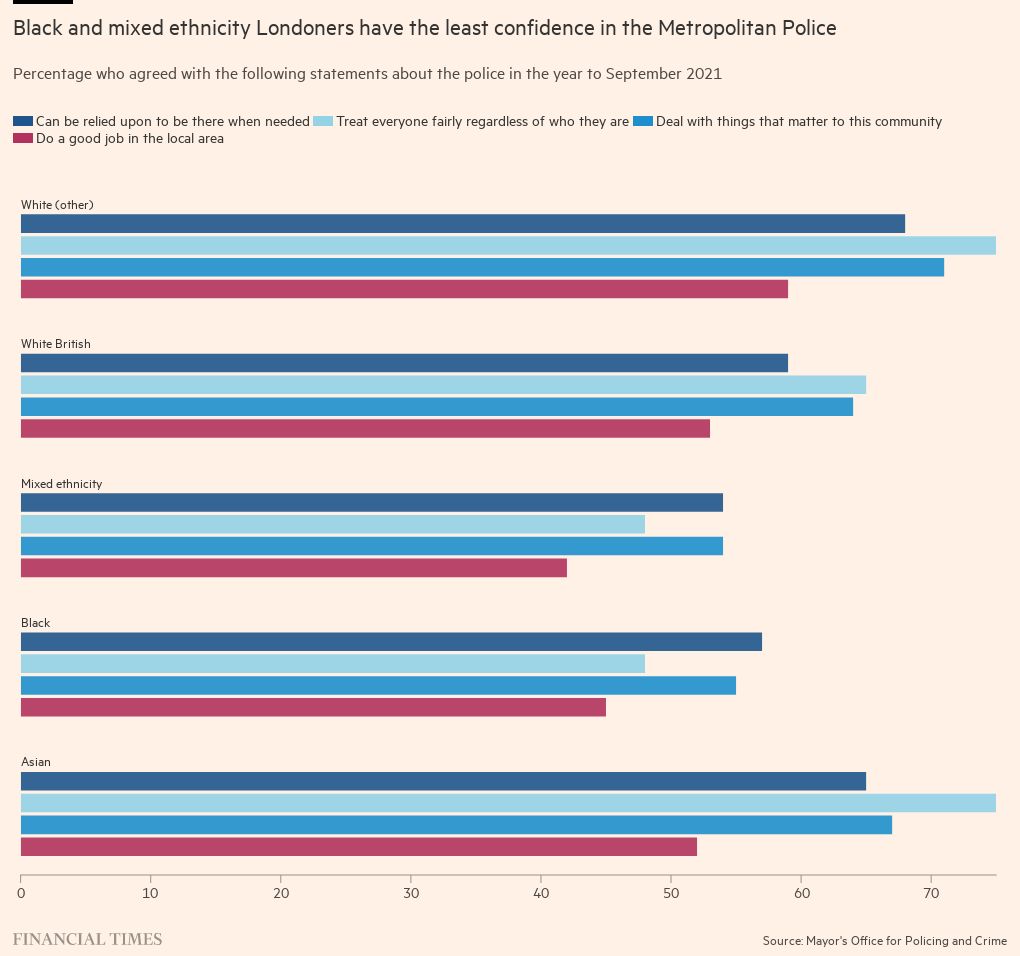
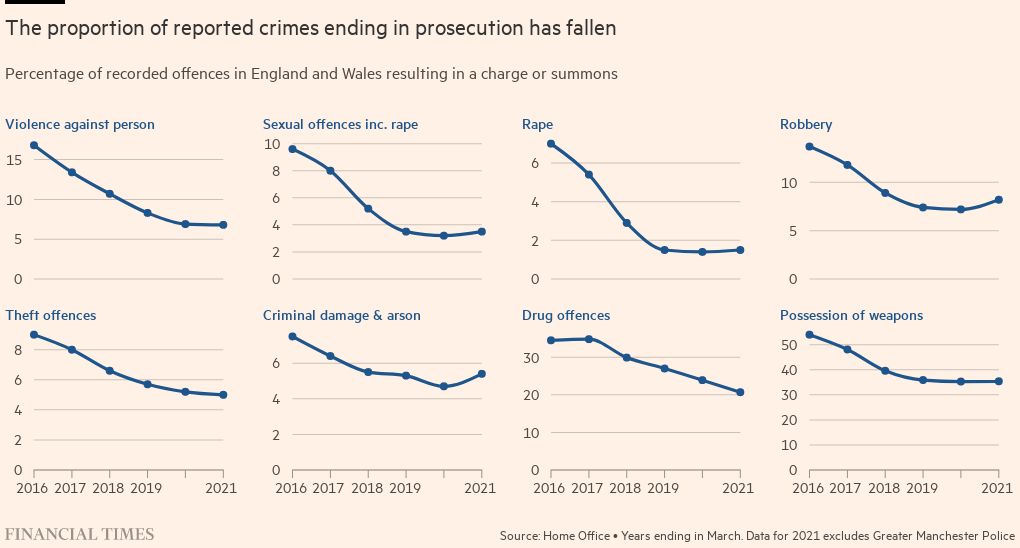
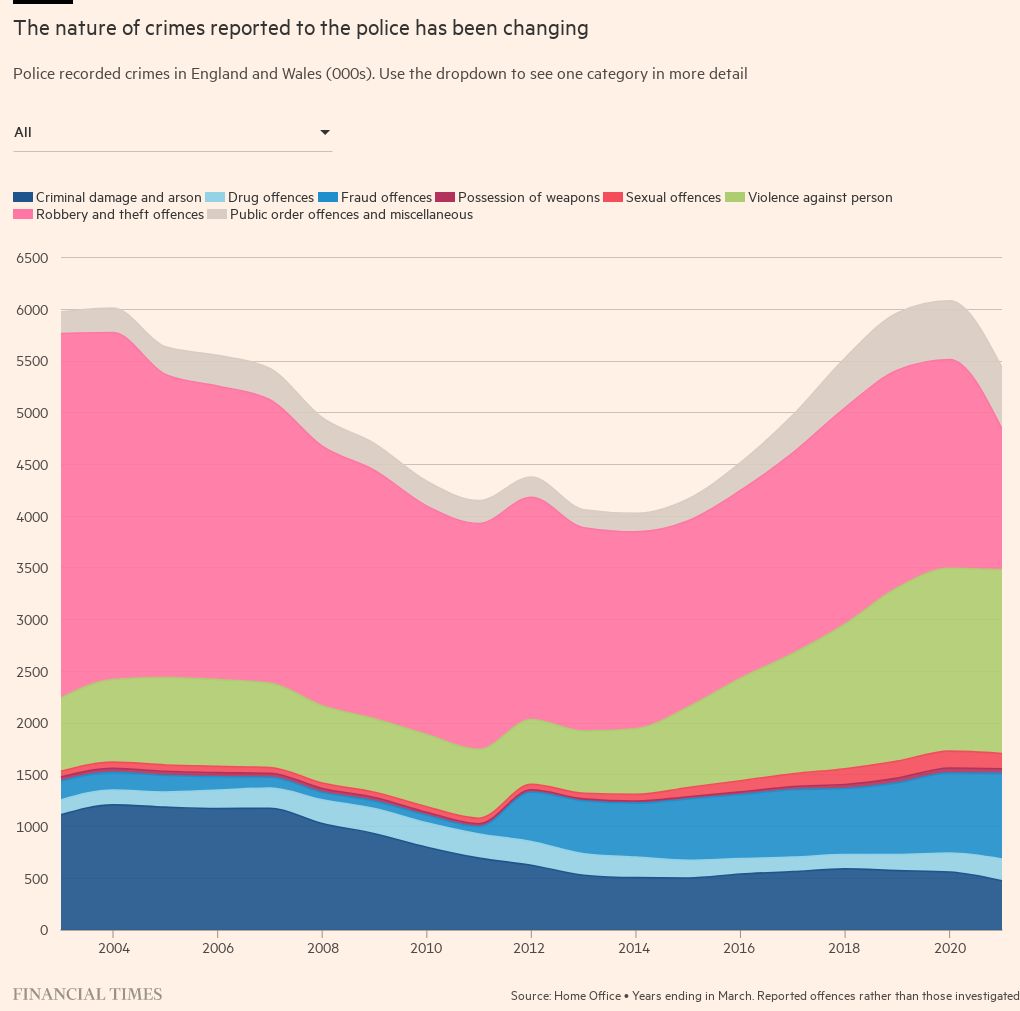
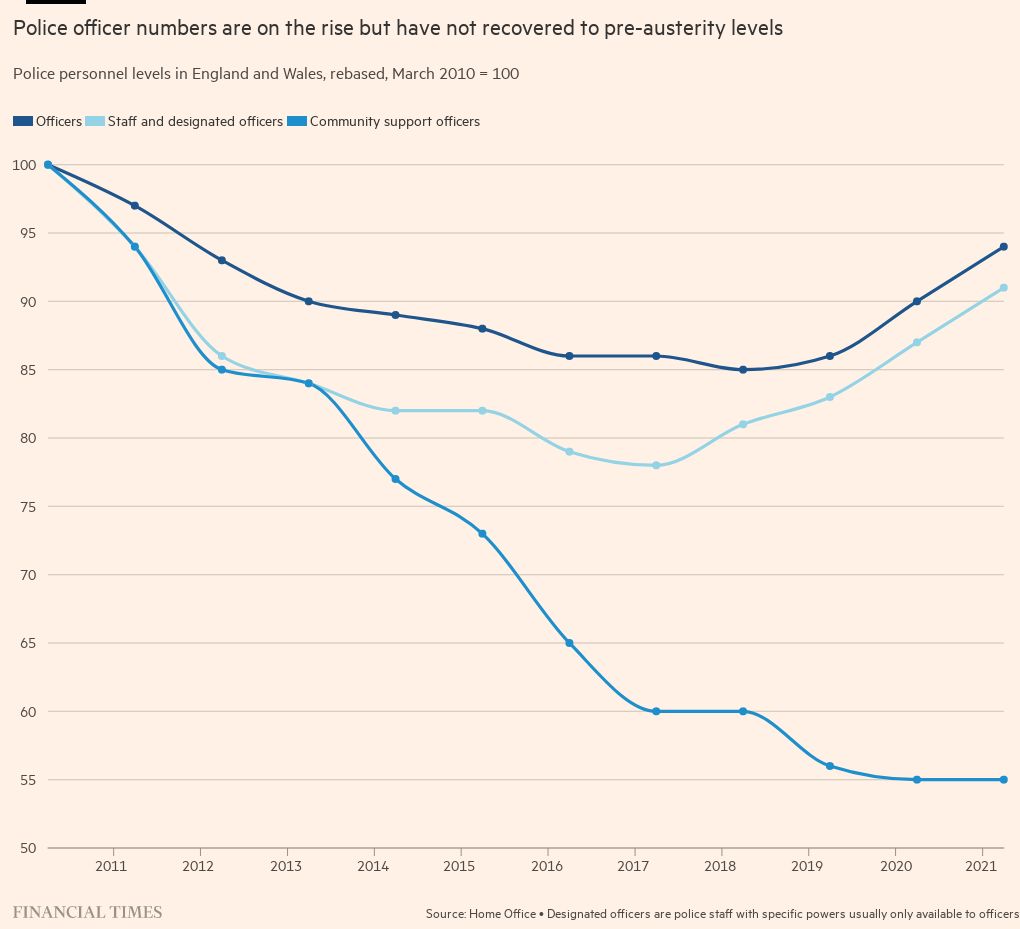
Comments